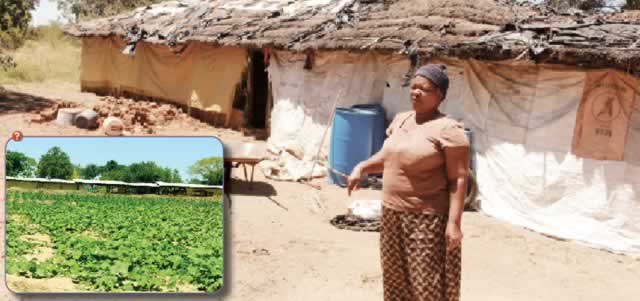Maleme: a farming paradise locals refuse to lose


Bongani Masuku outside her fowl run at Maleme Ranch. Inset: Some of the vegetables grown at Ebenezer College
Arnold Mutemi Features Editor
For the past three years, Bongani Masuku, a subsistence farmer’s wife from Matobo district in Matabeleland South province, has managed to pay school fees for her daughter at boarding school on time without any problem, something which many gainfully employed people are failing to do.
Now, she faces the prospect of going to her daughter’s school to ask for a payment plan to settle future fees or, worse, withdraw her altogether.
This is because her money spinning venture, a poultry project bankrolled by a local commercial farmer, is under threat after the benefactor’s ejection from his property.
Peter Cunningham, owner of Maleme Ranch in Matobo district, was ordered off the property after it was allocated to new farmer Rodney Mashingaidze under the Land Acquisition Act.
Cunningham is regarded by many villagers as a philanthropist who has transformed villagers’ way of life by sponsoring various income generating projects in the area.
Villagers from Shumba Shaba Village, angered by the removal of the white farmer, have staged demonstrations demanding his return.
Some have been arrested and have a pending case in court after they were alleged to have kidnapped one of the new farmer’s workers.
The land dispute at Maleme Ranch has not been helped by the fact that the new owner, who is Shona, is seen as an outsider in a dominantly Ndebele speaking area.
However, the villagers say there is nothing tribal about their desire to have the land returned to Cunningham.
Villagers, who live on marginalised land where there is not enough land for cropping and grazing for their livestock, speak glowingly about Cunningham and their wish for him to continue farming operations in the area.
They say Cunningham has done a lot for them.
Through his farm, he has initiated several income generating projects for the local community.
One of the most successful projects is the poultry project run in six villages of Ward 16.
The poultry project has transformed the lives of locals who are now assured of a regular source of income.
Cunningham provides chicks, chicken feed, market and transport to the slaughterhouse free of charge.
The input costs will be deducted once the chickens have been sold.
All villagers have to do is build fowl runs and ensure that the chicks are properly looked after until they are ready for the market.
Masuku, who has benefited from the poultry project since 2008, is all praise for Cunningham.
She is proud that her daughter is at boarding school while her general living conditions have improved.
Masuku has a fowl run with a capacity to hold 1,000 birds.
After the expenses are deducted, she is guaranteed of no less than $500.
“If I get less than $500 from a batch, I would say the money is little. My daughter is in Form Three at a boarding school and the fees are paid for by this project, “she said.
Apart from the chicken project, Cunningham has parceled part of his farm to start an agricultural college with an enrollment of 70 students.
Ebenezer College grows vegetables including cabbages, butternut, onions and tomatoes.
The college, which also instills Christian ethos in students, is run by a Christian board. Students are from all over the country and they are paid from money realised from selling produce.
Villagers get priority every Tuesday and Thursday to buy cabbages from the college, most of which are re-sold to passing motorists and travellers at business centres along the Bulawayo-Maphisa road, further boosting household incomes.
They fear that the white commercial farmer’s departure will result in the collapse of these projects as the new farm owner will have different priorities or might not have capital to continue running the porjects.
Vegetable vendors will be forced to order fresh produce in Bulawayo, almost 100km away with a one-way trip costing $5.
“We want Cunningham to stay, otherwise we will die,” Masuku said.
At the college, Cunningham’s departure is already being felt, with the college failing to grow cabbage after seedlings wilted due to lack of water.
“Our seed comes from Shalom. We were supposed to grow cabbages but couldn’t because there were no seedlings,” said a worker at the college.
Shalom is a section of the farm which has been taken over by Mashingaidze.
Villagers say they sometimes ask Cunningham for permission to graze and water their livestock on his farm especially in times of drought.
A villager, who did not want to be named because of a pending criminal case involving the farm saga, feels the turning of the land dispute into a tribal one was wrong and unfortunate.
He said the dispute at Maleme Ranch was not about the tribe of the land beneficiary.
The villager said if the farm cannot be returned to Cunningham, they were ready as villagers to take over the property as a community project instead of it benefiting an individual.
“It’s not about him being a Shona. It’s about locals benefiting from local resources,” he said.
The villager said there were four other new farmers who had been allocated land on the ranch who they also wanted out because they were outsiders.
“These people are Ndebele but aren’t from this area. We also want them out.”
The villager said the land on which the disputed farm is located originally belonged to their forefathers who were moved to “reserves” by colonial settlers and should be returned to them.
He said land in their communal area was no longer enough for the 182 households and their 500 head of cattle as they were confined to a narrow belt surrounded by granite outcrops.
“We aren’t saying Mashingaidze should move out because he is Shona. These farms were created by colonisation. Our ancestors were forcibly removed by colonialists and we want to reclaim the ranch because it’s our inheritance.”
The villager, however, conceded that Cunningham had done a lot for the community and his departure would have negative repercussions.
He said new farmers allocated land by government under the land reform programme were impounding their cattle if they strayed onto their properties in search of pastures and making them pay fines, something which never used to happen when Cunningham was still the owner.
The villager said in times of drought, such as the looming one, Ebenezer College would provide them which cheap maize grown under irrigation with water drawn from Maleme dam.
“Their prices were very low compared to anywhere in the country. If you didn’t have money, they could even give you for free,” he said.










Comments